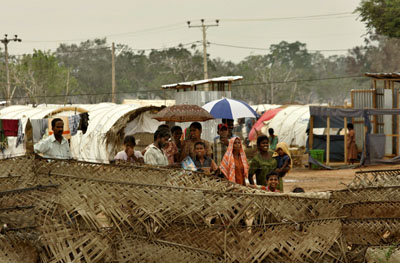
In northeastern Sri Lanka, the humanitarian situation for displaced Tamils has been steadily worsening in recent months but seemed to reach a desperate level over the weekend when flash floods saturated the region in the northwestern part of the country where roughly 280,000 people remain in camps following the showdown last spring between the Tamil Tigers and the Sri Lankan government. OCHA is reporting that more than 16,000 people are at great risk after heavy rains destroyed tents and critical facilities in a series of zones inside the Vavuniya District and the Manik Farm camp. The deteriorating situation led to small protests in Manik Farm, the camp visited by U.N. Secretary General Ban Ki-moon last spring.
The Sri Lankan Government continues to essentially intern people in camps until it is satisfied that the Sri Lankan military have rooted out every last member of the reportedly now defunct Tigers from among the civilian population.
Key U.N. officials, as well as key human rights groups, have criticized the Sri Lankan government for their treatment of Tamil IDPs throughout the North. However, attempts to refer the situation to the United Nations Human Rights Council were rebuffed earlier this summer by members of the council, notably China, who argued that Sri Lanka’s internal affairs should not be fodder for the United Nations – despite the urgings of Navi Pillay, the U.N.’s top human rights official.
The government has paid lip service to the humanitarian crisis, promising to do all it can to speed up the process and allow displaced people to return home. But so far the words have not translated into effective action and the pace of its efforts is still woefully slow. The Tigers were ruthless fighters who terrorized the small island nation for decades, routinely using the suicide bombing tactics they invented and using human shields to protect themselves, in the name of protecting Sri Lanka’s Tamil minority. However, it seems to me that the government’s current strategy to ensure the Tigers do not reemerge could do more harm than good and provide an rallying call for further anti-government action.

